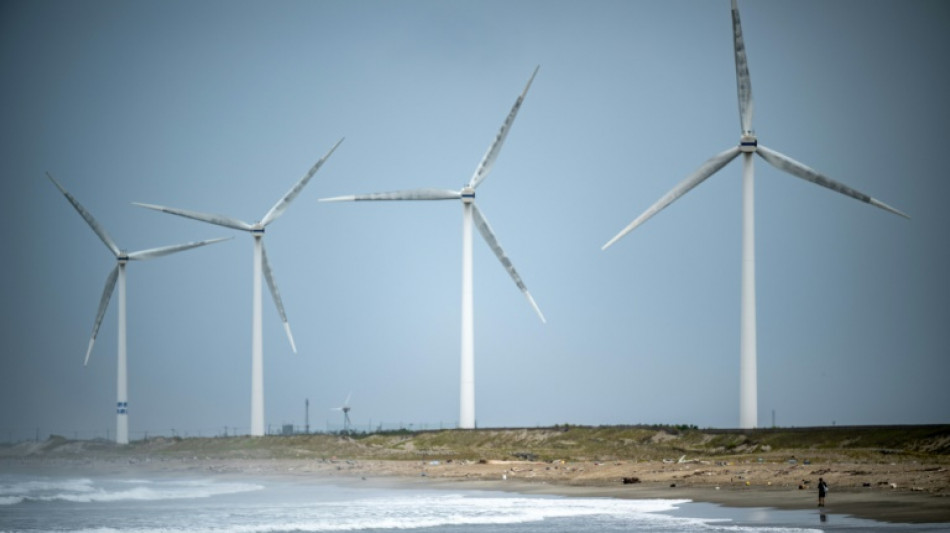
-
 Lillard will try to match record with third NBA 3-Point title
Lillard will try to match record with third NBA 3-Point title
-
Vonn breaks leg as crashes out in brutal end to Olympic dream

-
 Malinin enters the fray as Japan lead USA in Olympics team skating
Malinin enters the fray as Japan lead USA in Olympics team skating
-
Thailand's Anutin readies for coalition talks after election win

-
 Fans arrive for Patriots-Seahawks Super Bowl as politics swirl
Fans arrive for Patriots-Seahawks Super Bowl as politics swirl
-
'Send Help' repeats as N.America box office champ

-
 Japan close gap on USA in Winter Olympics team skating event
Japan close gap on USA in Winter Olympics team skating event
-
Liverpool improvement not reflected in results, says Slot

-
 Japan PM Takaichi basks in election triumph
Japan PM Takaichi basks in election triumph
-
Machado's close ally released in Venezuela

-
 Dimarco helps Inter to eight-point lead in Serie A
Dimarco helps Inter to eight-point lead in Serie A
-
Man City 'needed' to beat Liverpool to keep title race alive: Silva

-
 Czech snowboarder Maderova lands shock Olympic parallel giant slalom win
Czech snowboarder Maderova lands shock Olympic parallel giant slalom win
-
Man City fight back to end Anfield hoodoo and reel in Arsenal

-
 Diaz treble helps Bayern crush Hoffenheim and go six clear
Diaz treble helps Bayern crush Hoffenheim and go six clear
-
US astronaut to take her 3-year-old's cuddly rabbit into space

-
 Israeli president to honour Bondi Beach attack victims on Australia visit
Israeli president to honour Bondi Beach attack victims on Australia visit
-
Apologetic Turkish center Sengun replaces Shai as NBA All-Star

-
 Romania, Argentina leaders invited to Trump 'Board of Peace' meeting
Romania, Argentina leaders invited to Trump 'Board of Peace' meeting
-
Kamindu heroics steer Sri Lanka past Ireland in T20 World Cup

-
 Age just a number for veteran Olympic snowboard champion Karl
Age just a number for veteran Olympic snowboard champion Karl
-
England's Feyi-Waboso out of Scotland Six Nations clash

-
 Thailand's pilot PM lands runaway election win
Thailand's pilot PM lands runaway election win
-
Sarr strikes as Palace end winless run at Brighton

-
 Olympic star Ledecka says athletes ignored in debate over future of snowboard event
Olympic star Ledecka says athletes ignored in debate over future of snowboard event
-
French police arrest six over crypto-linked magistrate kidnapping

-
 Auger-Aliassime retains Montpellier Open crown
Auger-Aliassime retains Montpellier Open crown
-
Lindsey Vonn, skiing's iron lady whose Olympic dream ended in tears

-
 Conservative Thai PM claims election victory
Conservative Thai PM claims election victory
-
Kamindu fireworks rescue Sri Lanka to 163-6 against Ireland

-
 UK PM's top aide quits in scandal over Mandelson links to Epstein
UK PM's top aide quits in scandal over Mandelson links to Epstein
-
Reed continues Gulf romp with victory in Qatar

-
 Conservative Thai PM heading for election victory: projections
Conservative Thai PM heading for election victory: projections
-
Vonn crashes out of Winter Olympics in brutal end to medal dream

-
 Heartache for Olympic downhill champion Johnson after Vonn's crash
Heartache for Olympic downhill champion Johnson after Vonn's crash
-
Takaichi on course for landslide win in Japan election

-
 Wales coach Tandy will avoid 'knee-jerk' reaction to crushing England loss
Wales coach Tandy will avoid 'knee-jerk' reaction to crushing England loss
-
Sanae Takaichi, Japan's triumphant first woman PM

-
 England avoid seismic shock by beating Nepal in last-ball thriller
England avoid seismic shock by beating Nepal in last-ball thriller
-
Karl defends Olympic men's parallel giant slalom crown

-
 Colour and caution as banned kite-flying festival returns to Pakistan
Colour and caution as banned kite-flying festival returns to Pakistan
-
England cling on to beat Nepal in last-ball thriller

-
 UK foreign office to review pay-off to Epstein-linked US envoy
UK foreign office to review pay-off to Epstein-linked US envoy
-
England's Arundell eager to learn from Springbok star Kolbe

-
 Czech snowboard great Ledecka fails in bid for third straight Olympic gold
Czech snowboard great Ledecka fails in bid for third straight Olympic gold
-
Expectation, then stunned silence as Vonn crashes out of Olympics

-
 Storm-battered Portugal votes in presidential election run-off
Storm-battered Portugal votes in presidential election run-off
-
Breezy Johnson wins Olympic downhill gold, Vonn crashes out

-
 Vonn's Olympic dream cut short by downhill crash
Vonn's Olympic dream cut short by downhill crash
-
French police arrest five over crypto-linked magistrate kidnapping


Japan to make renewables top power source by 2040
Japan wants renewable energy to be its top power source by 2040 in a push to reduce dependence on coal and gas and become carbon neutral by mid-century, government plans showed on Tuesday.
Thirteen years after the 2011 Fukushima disaster, the plan also foresees a major role for nuclear power in helping to meet growing energy demand from artificial intelligence and microchip factories.
The world's fourth-largest economy -- which campaigners say has the dirtiest energy mix in the G7 -- had already set a goal of becoming carbon neutral by 2050.
Under the new plans, renewables such as solar and wind were expected to account for 40 to 50 percent of electricity generation by 2040.
That marks a jump from last year's level of 23 percent and a previous target for 2030 of 38 percent.
Resource-poor Japan "will aim to maximise the use of renewable energy as our main source of power", said the draft Strategic Energy Plan unveiled on Tuesday.
Government experts were reviewing the plan released by the Agency for Natural Resources and Energy and it will be presented to the cabinet for approval.
Japan is aiming to avoid relying heavily on one energy source to ensure "both a stable supply of energy and decarbonisation", the draft said.
Geopolitical concerns affecting energy lines, from the Ukraine war to Middle East unrest, were also behind the shift to renewables and nuclear, it said.
- Nuclear push -
Nearly 70 percent of Japan's power needs in 2023 were met by power plants burning coal, gas and oil -- almost all of which must be imported.
The government wants that figure to fall to 30 to 40 percent by 2040. The previously announced 2030 target was 41 percent, or 42 percent when hydrogen and ammonia were included.
The new plans forecast a 10 to 20 percent jump in overall electricity generation by 2040, from 985 billion kilowatt hours (kWh) in 2023.
"Securing decarbonised sources of electricity is an issue directly related to our country's economic growth," Yoshifumi Murase, the head of the national energy agency, told the government's expert panel on Tuesday.
Unlike the previous plan released three years ago, the draft no longer foresees reducing Japan's reliance on nuclear power "as much as possible" -- a goal set after the 2011 disaster.
The government pulled the plug on nuclear power plants nationwide after the tsunami-triggered Fukushima meltdown.
However, it has gradually been bringing them back online, despite a public backlash in some places, as it seeks to cut emissions.
It expects all its existing reactors to be in operation by 2024, and affirmed the government's plan to develop and use new next-generation nuclear reactors, as its existing facilities get older.
Nuclear accounts for about 20 percent of Japan's energy needs under the 2040 targets, around the same as the current 2030 target.
That would mean more than double the 8.5 percent of overall power generation that nuclear provided in 2023.
Japan, like many countries, sweltered through record-breaking summer temperatures this year.
It also saw its warmest autumn since records began 126 years ago. The famous snowcap of Mount Fuji was absent for the longest recorded period this year, not appearing until early November, compared with the average of early October.
P.Tamimi--SF-PST




